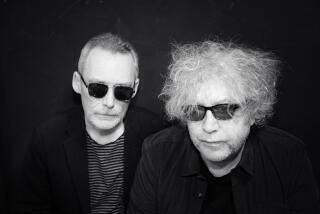Jackie Cain dies at 86; part of the jazz duo Jackie and Roy
- Share via
The piano player at a Chicago club called Jump Town wasn’t thrilled about letting the pretty blonde vocalist from Milwaukee do a few numbers.
“Nah, I don’t like to play for girl singers,” he told her friend. “They never know what they want to sing and when they tell you their key, it’s usually in the key of Z.”
After a drink with 18-year-old Jackie Cain, he relented. The two performed “Happiness Is a Thing Called Joe” and, as Cain later recalled, “It broke up the place. The club went nuts.”
Jackie Cain and the initially reluctant Roy Kral went on to become one of the most enduring duos in jazz, a married couple whose ease with each other infused more than 30 albums and enchanted club audiences over five decades.
Known for her swinging blend of bop and ballads, Cain died Monday at her home in Montclair, N.J. She was 86.
Her health had been declining since a stroke in 2010, said James Gavin, a family friend.
Cain’s husband died in 2002. The couple, professionally known as Jackie and Roy, had been married for 53 years.
“Their work had a delicacy, a subtlety and a joy to it,” jazz critic Nat Hentoff told the Los Angeles Times in 2002. “They were having fun, and it was infectious.”
Cain was most famed for her fast-paced renditions of standards like “Mountain Greenery” as well as her takes on songs that were relatively avant-garde. Jackie and Roy were the first big artists to record “Spring Can Really Hang You Up the Most,” a lyrical lament by writer Fran Landesman that riffed on T.S. Eliot’s line, “April is the cruellest month.”
She and Kral were also among the early adopters of “vocalese” — the singing of lyrics to jazz instrumentals.
“We always wanted to sound smart and in the groove, not sticky-sweet,” Cain said in a 2009 interview with jazz writer Marc Myers.
On his JazzWax website, Myers wrote that Cain “altered the direction of club singing from bluesy to breezy.”
Born in Milwaukee on May 22, 1928, Jacqueline Ruth Cain sang on local radio as a child and was part of the music-store-sponsored “Wurlitzer Melody Kids.” As a teenager, she sang at parties and clubs.
“I had strictly a Sophie Tucker style at that time,” she said. “They used to play up that little-girl-with-a-big-voice stuff.”
In 1946, she caught the eye of Chicago bandleader Jay Burkhart, who thought she’d be perfect for his band, the Jazz Cradle. With her mother’s hesitant permission, Cain left for Chicago and moved in with the bandleader’s family, sharing a room with his sister in an apartment behind the family meat store.
After she met Kral, her career took off. The two appeared on early Chicago TV and worked in “Bop for the People,” a septet led by tenor saxophonist Charlie Ventura.
With Ventura, they scored their first big hit, a be-bop arrangement of “I’m Forever Blowing Bubbles.”
“It was that song that really put them on the map,” said Gavin, a jazz historian. “It captured the fact that they’d crossed over from big bands to cabaret.”
In the early 1950s, Jackie and Roy struck out on their own, playing dates all over the country, sometimes with their two young daughters in tow. While Roy drove, Jackie heated baby food with the car’s cigarette lighter — a nomadic routine that made it seem attractive to put down roots in Las Vegas, with its abundance of work for musicians.
After six years of playing casinos, they moved to New York City in 1962. Club dates were sporadic but commercials were booming. With their upbeat phrasing, Jackie and Roy pitched Halo shampoo and “munch a bunch-a” Fritos. Jackie sang about having her Cheerios and feelin’ groovy.
“All of a sudden, money was just flowing in,” she told the Chicago Sun-Times. “We thought it was ridiculous, after making so little for so long.”
In 1973, their 20-year-old daughter Niki was killed in a car crash. When the stricken couple started working again many months later, they brought a new feeling to their songs.
“Everything had new meaning to it,” Cain said. “All the lyrics meant something else.”
They kept at it for decades.
Cain’s last major performance was in 2007, at a concert in New York honoring the 100th birthday of a friend, the late Alec Wilder, a jazz composer who wrote one of Jackie’s signature pieces, “While We’re Young.”
Cain’s survivors include her daughter Dana Kral and stepdaughters Carol May and Tiffany Bolling-Casares.
Twitter: @schawkins
More to Read
Start your day right
Sign up for Essential California for the L.A. Times biggest news, features and recommendations in your inbox six days a week.
You may occasionally receive promotional content from the Los Angeles Times.







